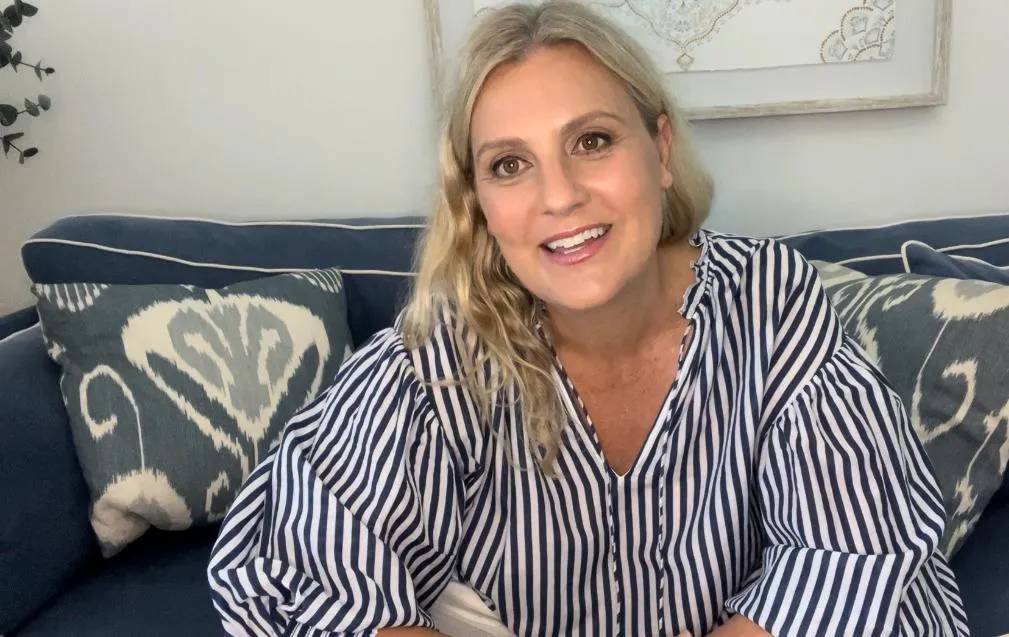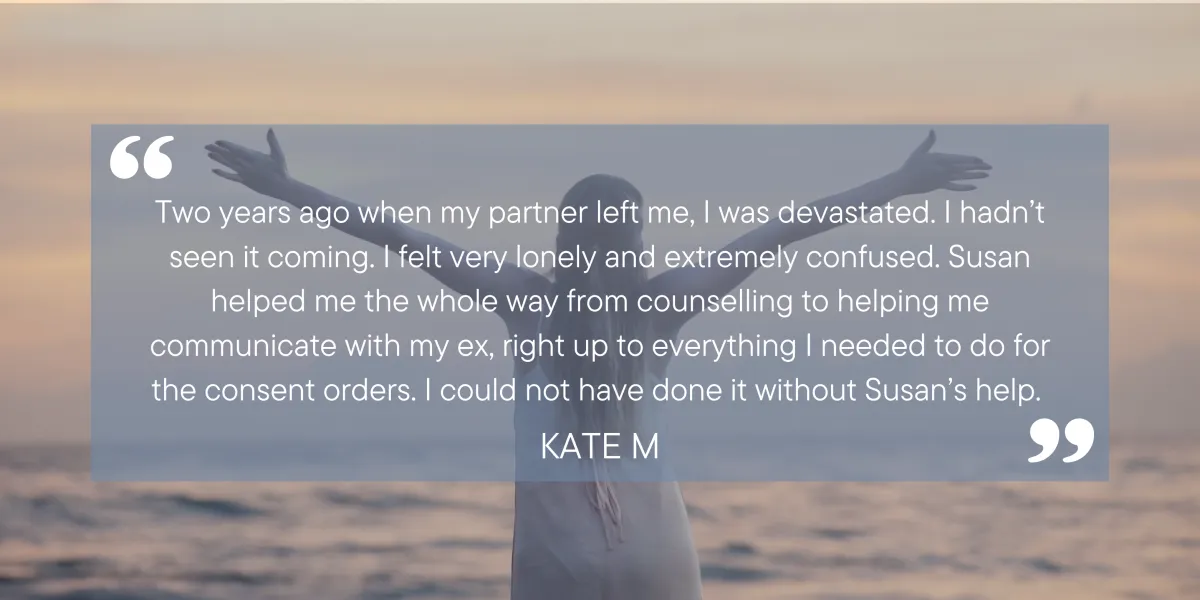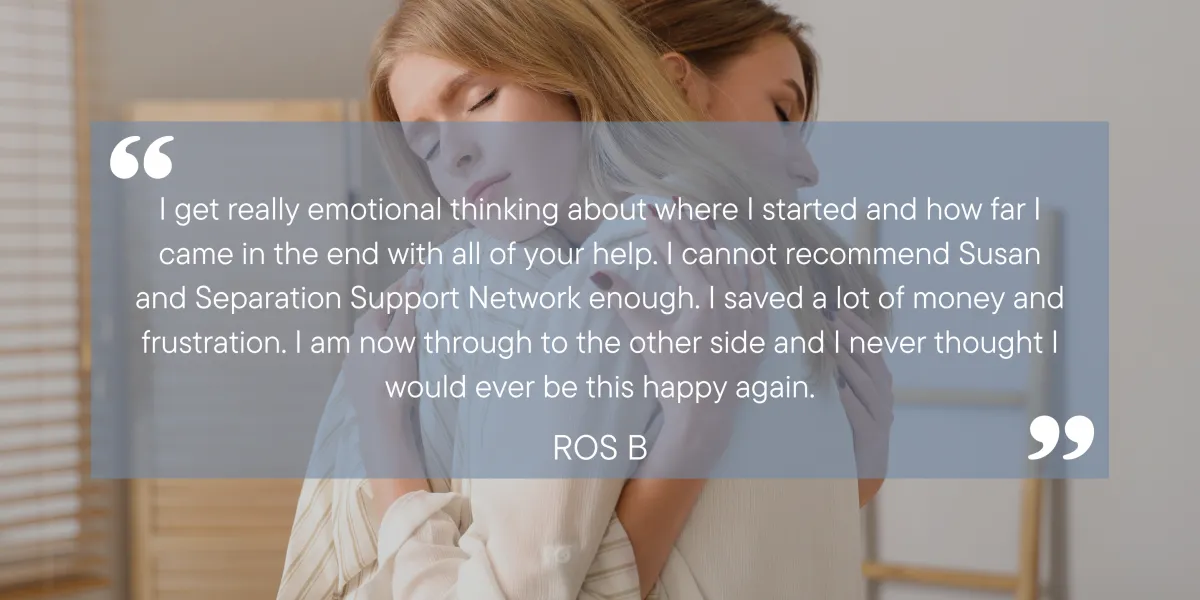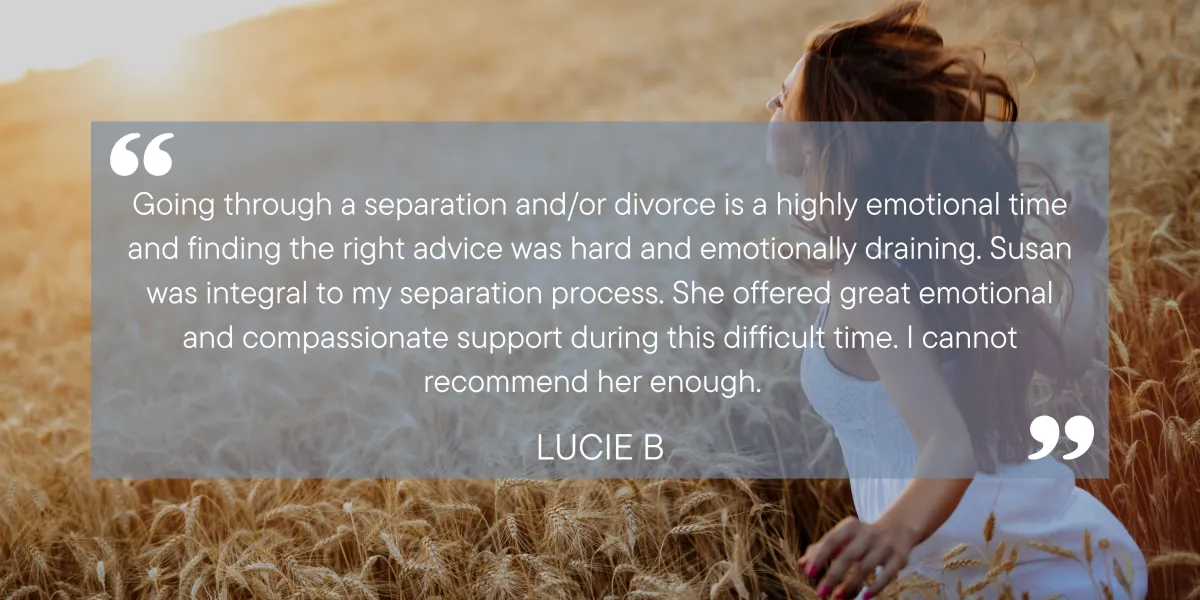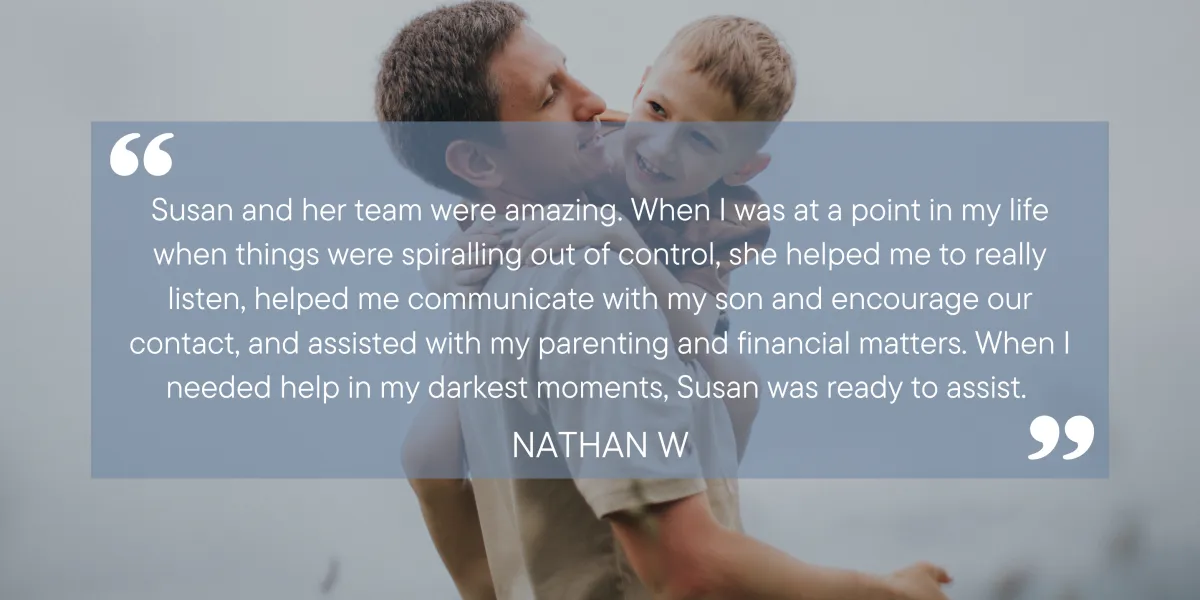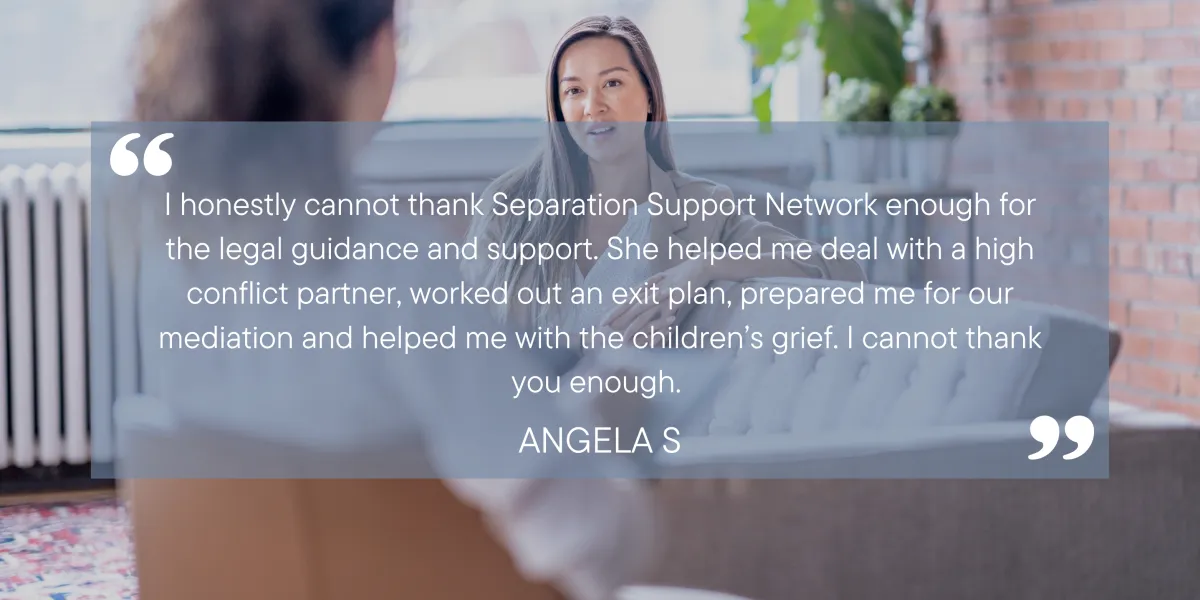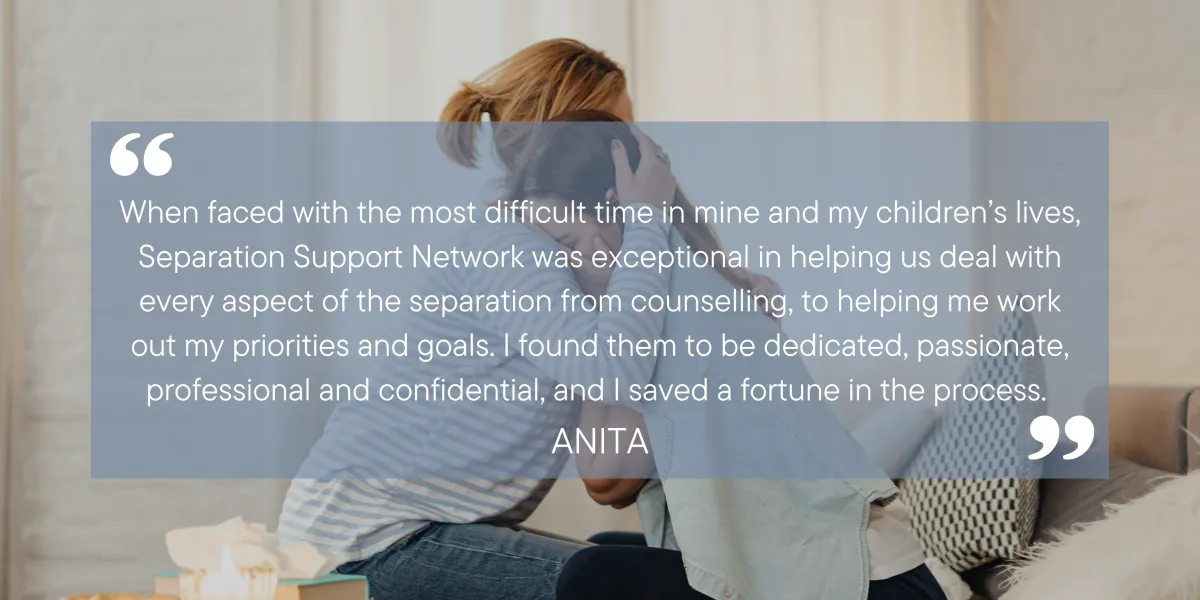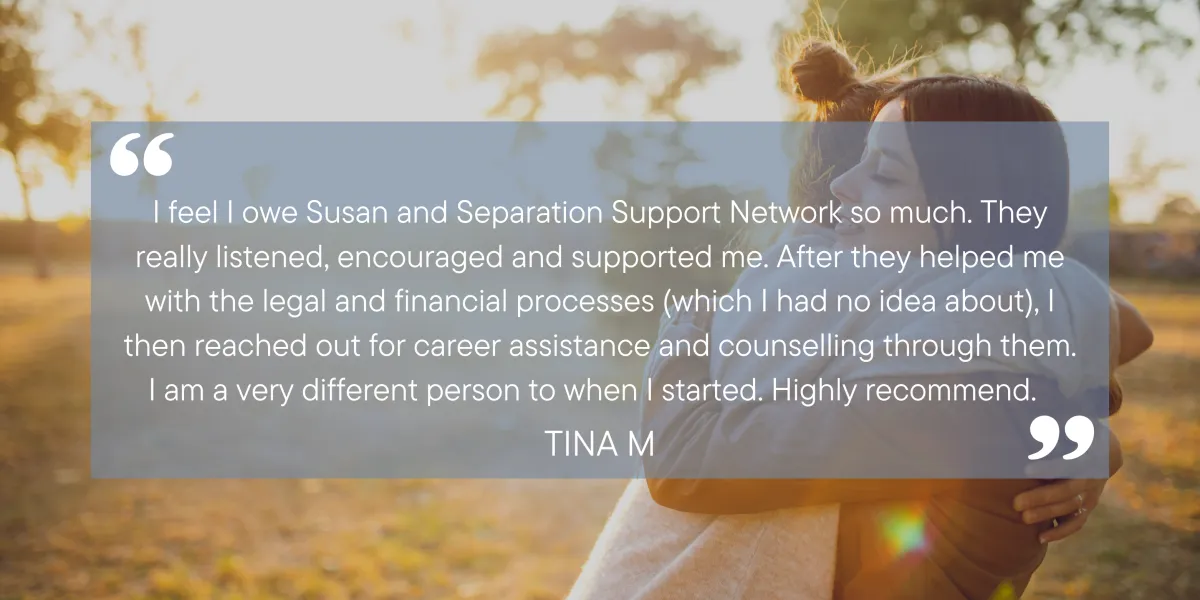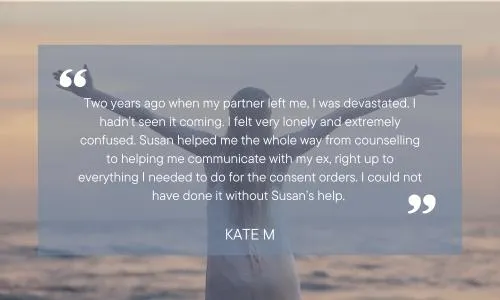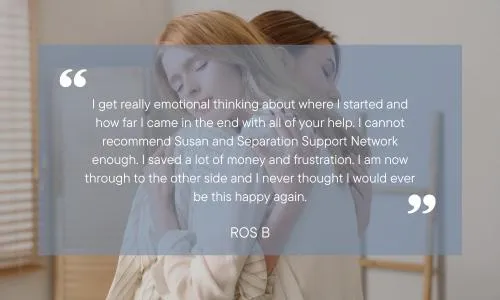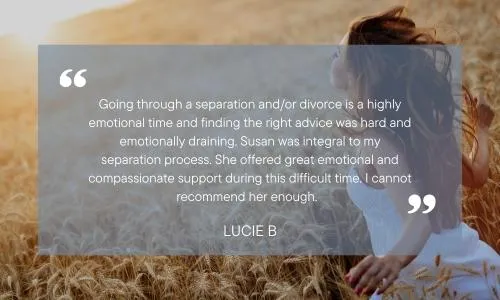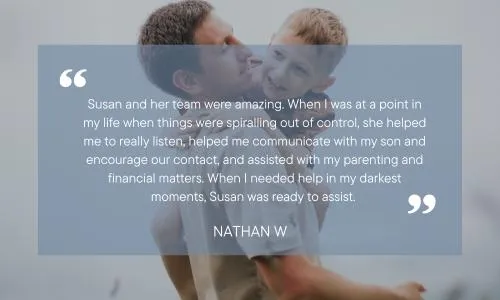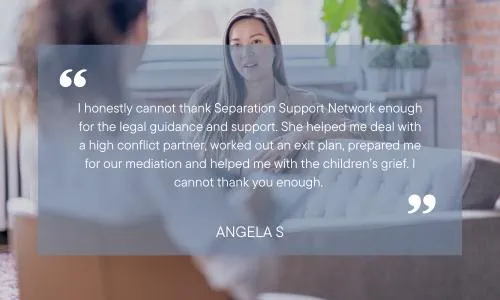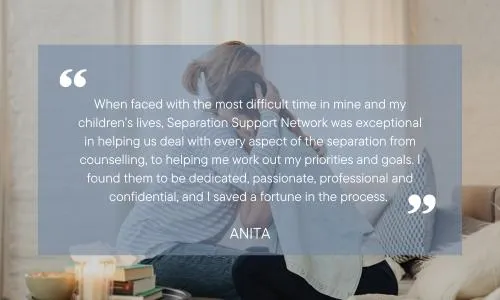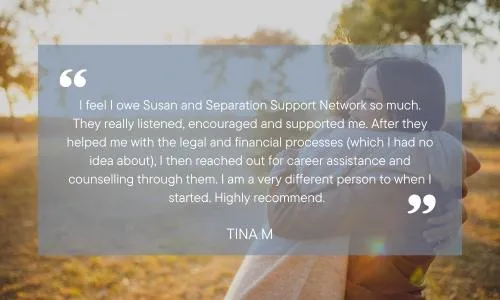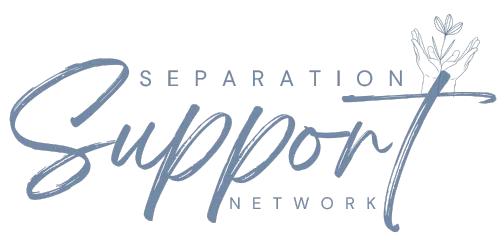
Are you considering or currently going through a Separation or Divorce and feeling:
🔵Confused, stressed and overwhelmed - needing clarity to work through your issues, set boundaries, identify triggers, reduce your stress levels, communicate with your former partner and the children?
🔵Want to save money - with a signficiantly cheaper hourly rate, guidance on how to get organised, the documentation and evidence you need, the administration you need to do, and avoid significant and often unnecessary additional legal and associated expenses along the way?
🔵Want to take more control of your own outcomes, reduce conflict, and negotiate more effectively?
🔵Need assistance to understand your financial position and how to improve your chances of achieving
long term financial security?
🔵Need help to consider the terms of your parenting and financial arrangements?
🔵Need to draft a Separation Plan? Regarding the kids, living arrangements, financial terms
🔵Need to sort your parenting arrangements and co-parent more effectively?
🔵Want to regain your strength and recover emotionally, financially, physically after the divorce is finalised?
Save yourself a lot of stress, money and chaos. We want to help you avoid conflict and the legal costs as much as possible! We would love to hear from you. Book a time to discuss how I can help to support and guide you in a less stressful, more emotionally supported and affordable way. I work with individuals, but also work with couples who want to work amicably together.
Hello, I am Susan Crain and I have been working as a
Separation & Divorce Support Counsellor & Coach for over 30 years, with hundreds of clients across Australia and New Zealand.
I have used my law degree, majoring in psychology and coaching to provide my clients with the emotional support, but also the guidance and strategies they need to be clear and confident about the process, personally safe, support their children and effectively co-parent, protect their finances and get very well prepared to resolve their family law matters and thrive beyond divorce.
After decades of seeing the devastating effects of poorly handled family law matters, the flow on effect to the children, safety concerns and the financial impact of huge expenses, I set up this business as a Social Enterprise. All our profits are returned to the business to increase the availability of really effective, personalised and affordable resources and services to people going through a separation - to better guide you through each stage of this often emotional, legal and logistically complex process - offering what my kind clients have said feels like
"a huge hug from beginning to end."

Ways we can help to get you through your separation and divorce?
EMOTIONAL SUPPORT & COUNSELLING
DRAFTING SEPARATION & PARENTING PLANS
PARENTING & CO-PARENTING SUPPORT
UNDERSTAND YOUR LEGAL & FINANCIAL OPTIONS
KEY COMMUNICATION & negotiation STRATEGIES
PREPARING FOR MEDIATION OR FDR
SUPPORT TO LIAISE WITH YOUR FORMER PARTNER
DOMESTIC & FAMILY VIOLENCE SUPPORT
IDENTIFYING/ Collating KEY DOCUMENTS & EVIDENCE

1:1 COACHING & COUNSELLING
SERVICES

THE DIVORCE
PLANNER
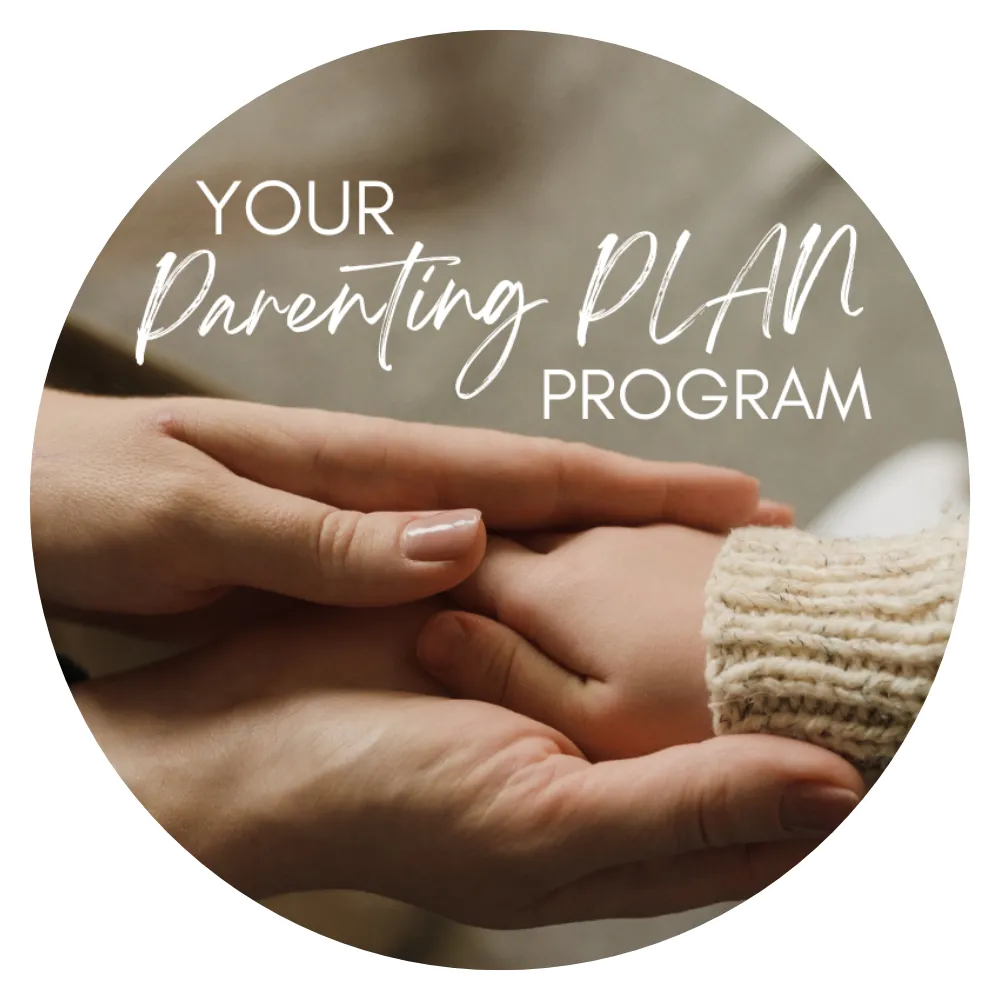
PARENTING PLAN
PROGRAM

SAFE HORIZON
SECURITY SUPPORT & THE AUSTRALIAN SAFETY PLANNER
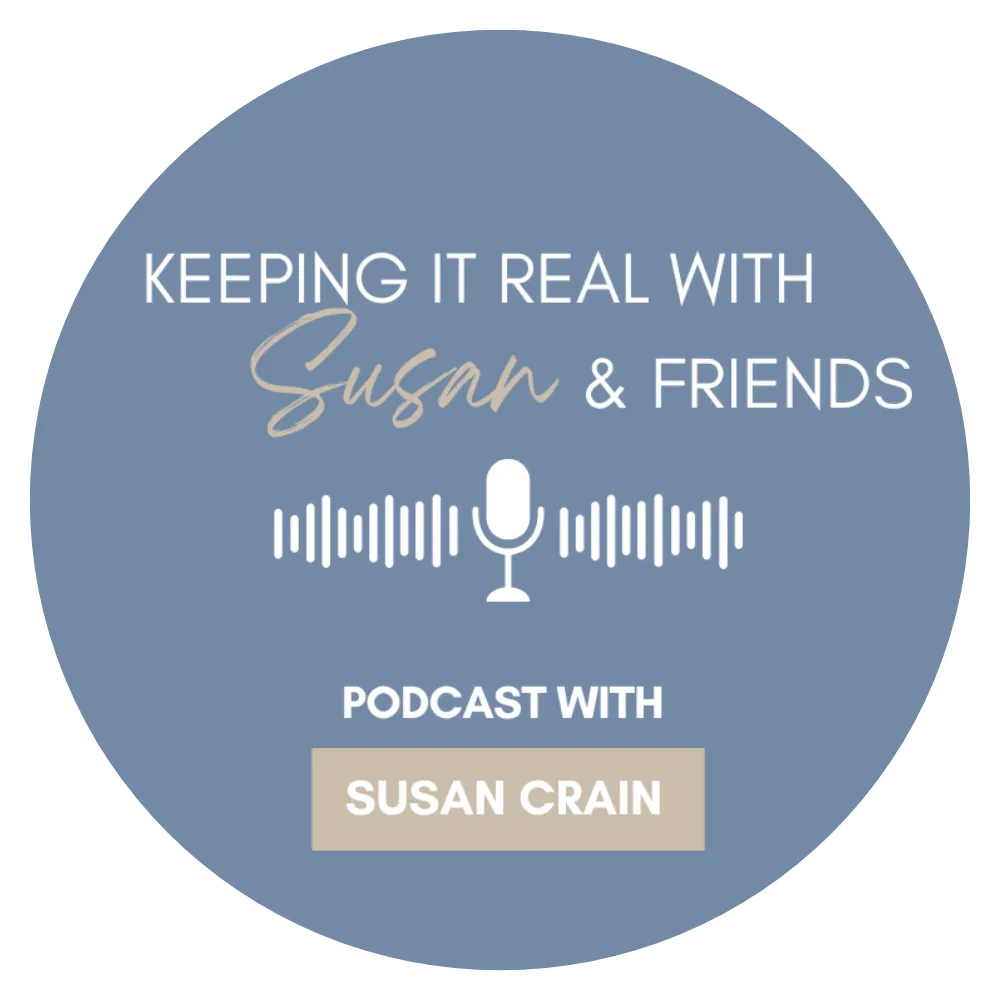
PODCAST
SERIES

CO-PARENTING SUPPORT

YOUR WEBINAR LIBRARY & RESOURCES
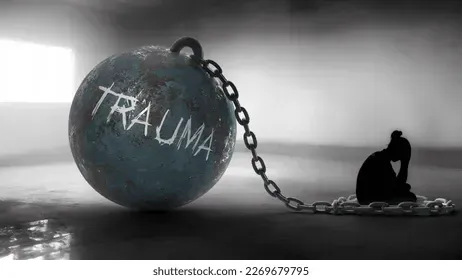
DV trauma can lead to PTSD
Abuse can take many forms, ranging from physical and emotional abuse, sexual assault, verbal abuse, financial/economic abuse, coercive control, and psychological actions or threats meant to harm or influence an intimate partner. It can happen at any age and affects people of all sexual orientations, ethnicities, religions, sexes and socioeconomic backgrounds.
Sadly, abuse victims may experience a wide range of physical and mental health symptoms resulting from domestic abuse trauma, including depression, anxiety, high stress levels, suicidal tendencies, panic attacks, substance abuse disorders, and sexual and reproductive health issues.
When we experience trauma, our brains become micro-focused on what needs to be done next in order to survive - to escape (flight), defend (fight) or immobilise (Freeze). Every other sensory input is essentially put on the back burner while our body and mind dedicates itself to surviving the threat.
Because domestic and family violence is often repetitive and consists of layers of emotional, verbal, psychosocial and/or physical abuse, the compounding affect never enables the mind to have the necessary break to properly process and heal the trauma from one traumatic event to the next, which in turn can cause post-traumatic stress disorder (PTSD).
PTSD is a psychiatric disorder in which a person has difficulty recovering after experiencing or witnessing a terrifying event or due to the compound effect of ongoing trauma.
Symptoms of PTSD are sometimes difficult to establish, as there is often a considerable overlap between PTSD and other mental health conditions but symptoms are normally defined by three overarching categories:
• Avoidance: Avoiding reminders or “triggers” of the traumatic event, such as people, places, smells, sounds, thoughts or events.
• Arousal and reactivity: Sudden inexplicable anger, outbursts, trouble sleeping, always on high alert, hypervigilant, compulsive risk assessment of situaitons, startling easily, paralysing nightmares, or may actually dissociate (check out) shutting down, feeling numb or regularly daydreaming/distant.
• Reliving the event: Being confronted by the emotional trauma of the event suddenly and without an obvious reason, resulting in emotional outbursts, chills, heart palpitations, aggression, extreme anxiety and other symptoms.
Left untreated, PTSD can cause long-term mental health effects, including anger management issues and severe depression and suicidal tendencies, and is believed to increase the likelihood of developing several life-threatening conditions including Type 2 diabetes, heart disease, high blood pressure and substance abuse disorders.
“The likelihood of PTSD increases after a domestic abuse event, and can worsen with recurring exposure to abuse but our patients need to be reassured that the effects can be mitigated through seeking the right support,” says psychologist Sherrin Bell.
Symptoms vary a lot between patients and treating PTSD in domestic abuse victims can be complicated, with no one-size-fits-all treatment. A mental health professional can devise a treatment plan to address specific symptoms but treatment can often be difficult if the patient remains in regular contact with the abuser.
Treatment often involves cognitive behavioral therapy (CBT), which can help victims manage the trauma of their experience. Most CBT based therapies aim to help patients feel safe, regulate their emotions, become more assertive, manage grief and the life transitions that may come with leaving an abuser, and to deal with depression and anxiety. Specialised treatments such as eye movement desensitisation and reprocessing (EMDR) are also reported to be having very successful outcomes for high trauma and PTSD.
Self-care is also really important to the recovery of any level of trauma. In addition to any prescribed medication and receipt of treatment, there are simple lifestyle changes you can make to improve your chance of recovery including:
• Regular exercise to help reduce stress levels.
• Leaning in on a trusted friend or relative for support and resisting the temptation to socially withdraw and isolate yourself.
• Considering what triggers your symptoms and work to better manage or eliminate the triggers and set clear boundaries.
• Get out in the fresh air, listen to great music, work on your sleep patterns, find your passions again avoid alcohol and non-prescribed drugs, eat well and stop the negative self-talk (remember abuse is never the victims fault- ever),
PTSD and high trauma may leave you feeling like you will never recover and return to your former self. But believe us when we tell you that you can move through it and will come out the other side. You need to be kind to you in the process and get the support and therapy you absolutely need. You've got this and it is worth investing in you. x

To receive helpful tips, podcast reviews, book reviews, offers, course discounts and other useful resources to better support you through the maze.
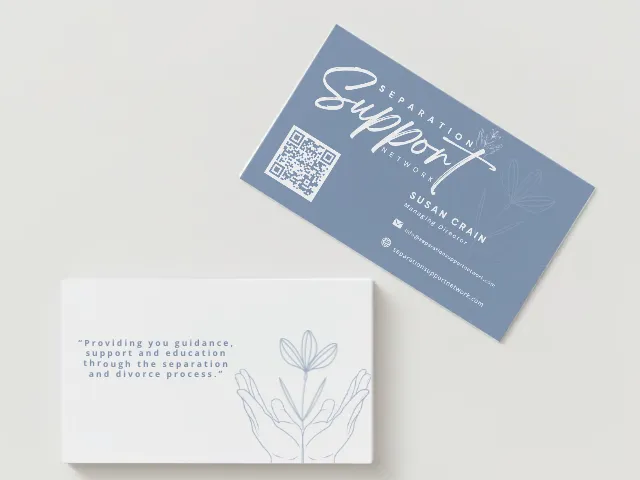
Questions about our
Services?
Cancellation or missed sessions policy
Given the nature of our support services, last minute cancellations are costly, and it means that other clients may miss out on receiving the required support. For cancellations within 48 hours of the scheduled appointment there is a $65 part fee payment. For less than 24 hours cancellation notice or a non-show, the full session fee will need to be charged. These fees are refunded however if the session can be filled at the last minute.
How are your counselling and coaching sessions held?
We know our clients are time poor. For your convenience, all our counselling or coaching sessions are now available online via Zoom.
You can book your appointment online via this website.
Zoom allows us to connect with you via video and audio. It just requires you to click on a link to join. You can sign up to Zoom to create a FREE account and download the Zoom Client for Meetings. Zoom does require internet connections.
After you book you will be sent a reminder about the booking and emailed a link to connect at the booked time. You are also likely to be sent a client information form to complete prior to your initial consultation to enable our Counsellors and Coaches to be better prepared for your first meeting.
If you are unable to make any of the dates available, please email us to see if we can accommodate an alternate time for you: [email protected]
If you live in Brisbane or the Gold Coast, Queensland, we are available for face to face consultations. Please email us at [email protected] if you would like to arrange an in person appointment.

Webinars - how they are received, transcripts and worksheets
Lorem ipsum dolor sit amet, consectetur adipisicing elit. Autem dolore, alias, numquam enim ab voluptate id quam harum ducimus cupiditate similique quisquam et deserunt, recusandae.

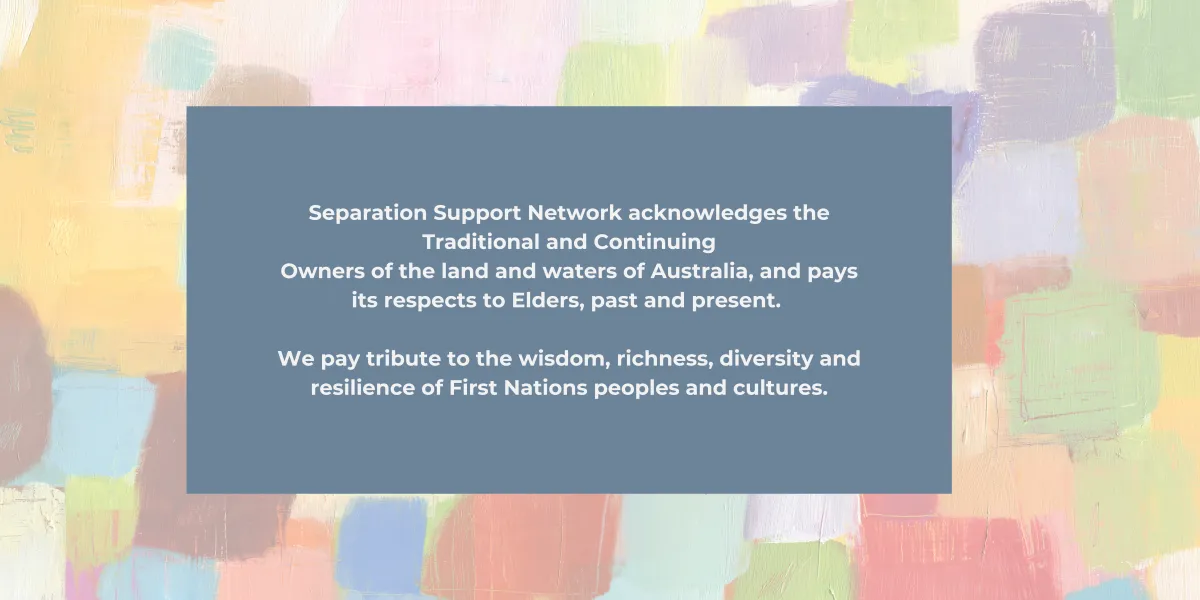
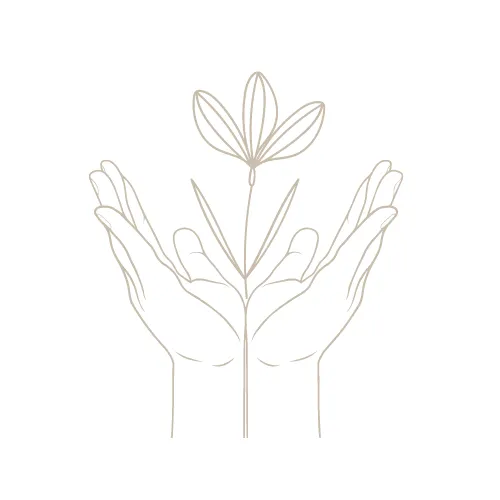

We are committed to protecting your personal information and respecting your privacy. This website uses cookies to analyze website traffic and optimise your website experience. By accepting our use of cookies, your data will be aggregated with all other user data.
DISCLAIMER: The material contained on this website is for general educational and information purposes only and is not a substitute for professional legal, financial, medical or psychological advice or care. While every care has been taken in the information provided, no legal responsibility or liability is accepted, warranted or implied by the authors or Separation Support Network and any liability is hereby expressly disclaimed. For specific advice please contact us at [email protected]. All information contained on the website remains the intellectual property of Separation Support Networkand is for your personal educational use only. The information must not be reproduced or distributed without the express permission of Separation Support Network.
We are committed to providing an inclusive and accessible environment where people and communities of all identities and backgrounds are accepted, safe and celebrated.
Privacy Policy | Terms and Conditions
